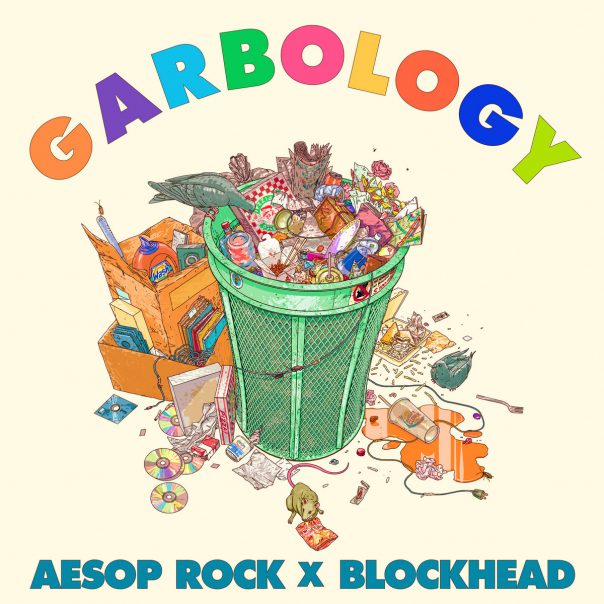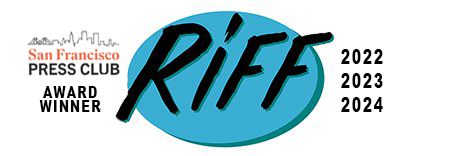REVIEW: Aesop Rock and Blockhead reunite in refuse on ‘Garbology’

After spending the last year away from others, perhaps we all got a glimpse into the isolation and madness that colors the mind of hip-hop hermit Aesop Rock. Like everyone else, Aesop also had a rough year, between the death of a close friend and a creative dry spell. But along the way, he partnered with long-time collaborator Blockhead, who had some beats for Aesop to rap over. This spur of the moment push for creative output evolved into an album; the first in Aesop’s discography to be completely produced by Blockhead—Garbology.
Garbology
Aesop Rock x Blockhead
Rhymesayers, Nov. 12
9/10
“Garbology” is the study of culture and society through the context of refuse and the manner in which a society disposes of it. While the title conceptually fits the way the album was conceived and completed, thematically it differs entirely—with a strict emphasis by Aesop Rock on death, isolation, kitsch, macabre and spirituality with a healthy dash of social criticism. It’s a lot to pack into an album following 2020’s rather dense and abstract Spirit World Field Guide.
Garbology opens with “The Only Picture,” a brief sample of dialogue from an artist expressing his technique of self-imposed tunnel vision when working on a new project. Clearly indicative of Aesop’s approach to making music, it takes listeners by the hand with single “Jazz Hands.” We get a sense of Blockhead’s stripped-down approach to production with instrumentals delivering more of an easy-listening vibe, moving from track to track. “Jazz Hands” begins with rattling alongside light synths and an electric guitar that softly plays in the background. Aesop Rock begins rapping about the social unrest of last year, observing the chaos with a casual familiarity like an old soul who’s seen it all before.
“Wolf Piss” has Aesop showing off his chops for compelling visuals as he describes the kind of beast he’s evolved into (musically) since moving out to live in a barn in rural Oregon. The plinking xylophone and croaking synths deliver this vibe like you’ve entered a crypt and bear witness to the mystifying, if unsettling, manifestation of what the rapper has become. Aesop Rock revisits these themes on “Oh Fudge,” with more of a satirical, self-jabbing approach to the same concept.
“Legerdemain” opens with light bass licks and garage snares reminiscent of Aesop’s early work. Here he reflects on sneaking out at night and getting into trouble. We get a glimpse into his outlook on how others perceive and interact with him on “Difficult,” where he owns his bizarre antics with larger than life descriptions of what he really desires. “All the Smartest People” is probably the most telling in terms of how Aesop Rock perceives himself and others, though, with pinging bells, hand drums and light horns. He examines his overwhelming anxieties and lack of self trust; and in turn how he thinks the smartest people he knows are those who don’t trust their own judgements.
We get a glimpse of Rob Sonic on “Flamingo Pink.” He provides backup to Aesop’s vocals. The soft, industrial percussion pairs well with bare piano and the light strums of electric guitar, as Aesop reflects on his disappointment in meeting those who inspired him and whom he trusted—immediately followed by a deeply self-aware critique of his own character flaws. He sees himself being just as capable of deception. Homeboy Sandman joins Aesop Rock on the next track, “All Day Breakfast,” where the two present themselves as beyond otherworldly due to their creative output being unmatched.
“Fizz” features a somewhat ironic climbing synth melody, with Aesop rapping about his introverted nature and general disdain for having to socialize with others at any given time. We return to the social critique with which the album on “That is Not a Wizard.” Here, Aesop criticizes the sociopolitical climate that has been propped up by a complicit media and government that actively sews dissent among its own viewers and citizens. The muffled guitar strikes that gradually build on “The Sea” are compelling, as Aesop paints a picture of how different his perception to the world is from those around him—as if he’s stuck wearing a pair of kaleidoscope eyeglasses that enable him to view insights to which the rest of us are blind.
The album closes out with “Abandoned Malls,” quickly dragging listeners back into the cold reality in which this album was birthed. Aesop laments the loss of a friend and, with the culmination of anguish, it’s sobering to consider the impact all of this has had on Aesop Rock.
Follow editor Tim Hoffman at Twitter.com/hipsterp0tamus.
